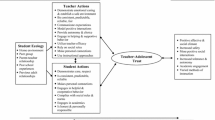Abstract
In this article an analysis of ‘trust’ is given and two basic forms of trust are distinguished, viz., trust in powers and trust in inclinations. These forms of trust allow us to gain a better understanding in the pivotal role trust plays in the relationship between caretakers, parents and children. It is argued that it makes no sense to speak about basic mistrust of infants, and that having unlimited trust in the inclinations of adults is only a virtue in children. By having trust in both the powers and inclinations of children, parents stimulate the development of their self-confidence and moral identity.
Similar content being viewed by others
References
Baier, A.: 1986, ‘Trust and Antitrust’, in Ethics, January 231–260.
Baier, A.: 1985, ‘What Do Women Want in a Moral Theory?’, in Noûs 19, 53–65.
Bok, S.: 1978, Lying, Moral Choice in Public and Private Life, The Harvester Press, Hassocks, Sussex.
Bollnow, O.F.: 1965,2 Die Pädagogische Atmosphäre, Heidelberg.
Bollnow, O.F.: 1958, Wesen und Wandel der Tugenden, Frankfurt/M.
Erikson, E.H.: 1964, Het Kind en de Samenleving, Utrecht,
Gambetta, D. (ed.): 1988, Trust, Making and Breaking Cooperative Relations, Blackwell, Oxford.
Gambetta, D.: 1988, ‘Can We Trust Trust?’, in D. Gambetta (ed.), 213–237.
Grossmann, K.: 1988, ‘Entwicklung und Bedeutung von Vertrauen aus der Sicht der Psychologie’, in Pädagogische Welt XLII, 435–439.
Harrison, B.: 1984, ‘Moral Judgement, Action and Emotion’, in Philosophy 59, 295–321.
Held, V.: 1984, Rights and Goods, Justifying Social Action, The Free Press, New York.
Langeveld, M.J.: 1971, Beknopte Theoretische Pedagogiek, Wolters, Groningen.
Luhmann, N.: 1988, ‘Familiarity, Confidence, Trust: Problems and Alternatives’, in D. Gambetta (ed.), 94–109.
Luhmann, N.: 1979, Trust and Power, Wiley, Chichester (etc.).
Slote, M.: 1983, Goods and Virtues, Clarendon Press, Oxford.
Spiecker, B.: 1984, ‘The Pedagogical Relationship’, in Oxford Review of Education 10 (2), 203–206.
Steutel, J.W.: 1984, ‘Deugdzaamheid Als Opvoedingsdoel’, in: J.W. Steutel (ed.), Morele Opvoeding, Boom, Meppel.
Williams, B.: 1988, ‘Formal Structures and Social Reality’, in D. Gambetta (ed.), 3–14.
Ijzendoorn, M.H. van: 1988, ‘De Ontwikkeling van Gehechtheid, Determinanten en Effecten’, in W. Koops and J.J. van der Werff (red.), Overzicht van de Ontwikkelingspsychologie, Deel III, Wolters-Noordhoff, Groningen.
Author information
Authors and Affiliations
Rights and permissions
About this article
Cite this article
Spiecker, B. Forms of trust in education and development. Stud Philos Educ 10, 157–164 (1990). https://doi.org/10.1007/BF00372681
Issue Date:
DOI: https://doi.org/10.1007/BF00372681




